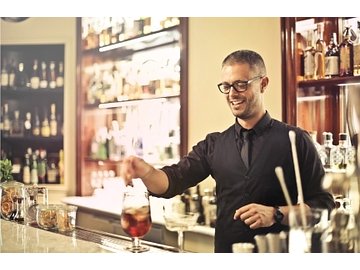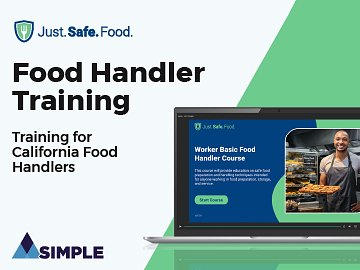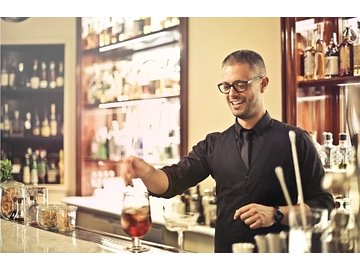Filter by
Sort
Sub-category
Training Bundles
- Artificial Intelligence
- California HR Essentials
- Cybersecurity Essentials
- Digital Transformation
- Diversity, Equity & Inclusion
- DOT/CDL
- Drug and Alcohol Compliance
- Financial Compliance
- First Aid
- Food Safety
- HIPAA Compliance
- HR Essentials
- Leadership
- Mental Health & Wellbeing
- OSHA / Construction Safety
- Personal Development
- Project Management
- Retail
- Workplace Harassment
- Workplace Safety
State
Language
Tags
Price
Duration
Audience
Online Food & Alcohol Courses
Courses

Food & Alcohol
Illinois BASSET Certificate Training

Food & Alcohol
Drug Free Workplace Program for Employees

Food & Alcohol
Compliance:Supervisor (Reasonable Suspicion)

Food & Alcohol
Sorting Out the Confusion Around CBD Course

Food & Alcohol
Drug-Free Compliance: Supervisor Essentials

Food & Alcohol
Drug-Free Compliance: Employee Essentials (Alcohol)

Food & Alcohol
Drug-Free Compliance: Employee Essentials

Food & Alcohol
Food Handler's Training Course (Spanish)

Food & Alcohol
Allergen Awareness Training Course (Spanish)

Food & Alcohol
Drug Free Workplace Program for Supervisors

Food & Alcohol
Drug Identification and Paraphernalia - Course
About Food & Alcohol Training
One of the first things you learn working in a restaurant is that food and drinks can make or break a business, making responsible alcohol training essential. I knew a bar owner who still talks about the night an employee overserved a guest, highlighting the importance of responsible alcohol training. Nothing terrible happened that evening, but the next morning, he was on the phone with his lawyer discussing the implications of not having the proper food handler certification. That scare was enough to change how he looked at training forever. Food & alcohol training isn’t just about checking boxes for compliance. It’s about protecting people, keeping the doors open, and making sure nights like that don’t end badly.
Why Food & Alcohol Training Matters
Most people think training is paperwork, rules, and boring videos, but effective alcohol safety training can change that perception. But if you’ve ever had a health inspector show up unannounced or had to stop serving someone who’s had too much alcohol, you know it’s bigger than that — it’s about responsible alcohol service.
Food training keeps kitchens from sending out contaminated meals and ensures every food handler understands safety requirements. Alcohol training keeps bartenders and servers from overserving and putting themselves or the business in a bad spot. It’s not just regulations — it’s the day-to-day things, like training programs, that stop problems before they blow up.
The Headaches Managers Deal With
If you run a bar or restaurant, you’ve probably dealt with at least one of these:
-
New hires coming in every week and needing training, again and again, can benefit from an online program like learn2serve®.
-
State laws that change just enough to keep you guessing.
-
Servers who roll their eyes at “another training session” might benefit from an engaging online program like learn2serve®.
-
Inspectors showing up with clipboards when you least expect it.
-
Trying to fit training into a schedule that already feels impossible.
And while you’re putting out those fires, you’re also trying to keep customers happy and the business running.
What Actually Works
Good training isn’t a three-hour slideshow nobody pays attention to. The material that resonates more closely resembles this: practical applications from the food handler card program.
-
Short, simple lessons people can finish between shifts are ideal for effective food handler certification.
-
Examples that sound like the real job — not something out of a textbook — are crucial for food handler certification.
-
Mobile-friendly so servers or cooks can do it right from their phone.
-
Certificates and tracking provide proof when someone asks for it, especially regarding food handler cards and compliance.
When training feels practical, employees don’t just “get it over with.” They use it.
More Than Compliance
Here’s the thing: one mistake can cost thousands of dollars, a liquor license, or worse, someone’s safety. But the payoff of good training is more than avoiding fines. It’s fewer headaches for managers. It’s guests who feel safe and taken care of. It’s staff who know you’ve got their back when they have to make tough calls, like cutting someone off.
Training is protection. It’s also peace of mind.
Wrapping It Up
For business owners, bar managers, and anyone leading a hospitality team, food & alcohol training isn’t just a rule. It’s a safeguard — for your staff, your customers, and your business. It helps you breathe easier when inspectors walk in, and it keeps your nights focused on service, not damage control, especially when everyone has completed their alcohol safety training.
Food & Alcohol FAQs
Why is Food & Alcohol Compliance training important for businesses?
Food & Alcohol Compliance training protects public health and ensures businesses meet state and federal regulations. It educates staff on safe handling, responsible service, hygiene, and legal requirements for selling alcohol. Proper training reduces risks of contamination, legal penalties, and liability issues while building customer trust and loyalty.
How often should Food & Alcohol Compliance training be updated?
Training should be provided at the time of hire and refreshed annually, or whenever regulations change. Health and alcohol service laws vary by state and frequently update. Regular training ensures employees remain compliant with safety standards, licensing requirements, and customer service best practices in food and beverage environments.
Are online Food & Alcohol Compliance programs as effective as in-person training?
Online Food & Alcohol programs work well for teaching laws, regulations, and best practices. They are accessible, standardized, and convenient for staff. However, hands-on elements like food preparation, safe storage, or ID verification benefit from in-person training. A blended model often provides the most effective learning experience for food and alcohol compliance.
What happens if Food & Alcohol Compliance training is ignored or not applied?
Ignoring training can result in foodborne illness outbreaks, alcohol-related incidents, and severe penalties. Businesses risk losing their licenses, facing lawsuits, or paying heavy fines. Noncompliance also damages reputation and customer trust, leading to financial loss and long-term harm to brand credibility.
How can organizations measure the effectiveness of Food & Alcohol Compliance training?
Effectiveness can be evaluated through health inspection results, mystery shopper reports, and employee performance in real scenarios. Monitoring food safety scores, reduced violations, and customer satisfaction provide key indicators. Consistently passing audits and maintaining compliance demonstrate successful training.













